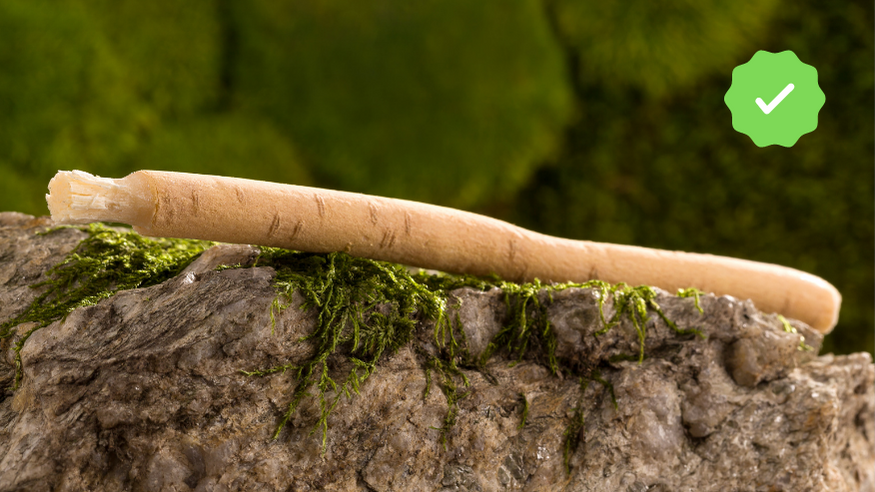Islam has given us clear guidelines on how to spend our lives in the best way possible. It covers the aspect of being devoted to Allah (SWT) while trying to thrive in the world. Not only Islam shows us the right way to be submitted to Allah (SWT), but it also tells us how we can improve our daily routines. From getting up early in the morning to using the miswak (wooden toothbrush), from being steadfast in the obligatory prayers to our personalities, everything is guided by Allah (SWT) through His Messenger, Prophet Muhammad (peace and blessings be upon him). Regarding those guidelines, we shall discuss miswak in this article. Let’s understand that we are not restricting toothbrushes as we know in today’s era, but reminding you to see how we can invoke Allah’s pleasure with a simple act such as using a miswak is rewarding.
Miswak and its Origin
Miswak is a small twig, typically obtained from the Salvadora persica tree, also known as the Arak tree or the toothbrush tree. Moreover, tree species such as olive tree, walnut tree, or tree of neem are also useful. This chewing stick is typically made with an average diameter of 1.0 cm and a length of 15 cm to facilitate entry into the mouth and positioning on tooth surfaces. Its central section has a spongy feel and plenty of phloems.
The origin of miswak is dated long before the emergence of Islam. Many civilizations, such as Babylonians and Egyptians, would use miswak for their oral hygiene practices. However, despite miswak having ancient origins, its significance has greatly increased after the emergence of Islam. It has become an act of following religious advice and symbolizes our Muslim community. Today, the miswak continues to be widely used by Muslims around the world as a means of maintaining oral hygiene and following the teachings of Islam. Here we can understand the importance of using a siwak with the following hadith:
Narrated Anas:“Allah’s Messenger (ﷺ) said, “I have told you repeatedly to use the Siwak. (The Prophet (ﷺ) emphasized the use of the Siwak.).” [1]
The Virtues and Benefits of Using Miswak
In today’s world, when the conventional toothbrush is widely used, the cost of siwak may be deemed lower than the toothbrush, particularly in areas where the plant source is grown locally. We shall discuss the virtues and benefits of using Miswak in Islam and how it can be the cause of our betterment, physically and spiritually. ‘Abdur-Rahman bin Abu ‘Atiq said:
“My father told me: ‘I heard ‘Aishah say, (narrating) from the Prophet (ﷺ): “Siwak is a means of purification for the mouth and is pleasing to the Lord.” [2]
Advantages Compared to Regular Toothbrush
- Siwak has a comparable effect on eliminating dental plaque and gingivitis as stannous fluoride usage. Users of sidewalks were shown to have equivalent oral hygiene and gingival health to people who use toothbrushes. [3]
- Furthermore, the randomized controlled clinical studies identified and assessed substantial antiplaque and antigingivitis benefits. [4]
- The discovery that siwak was used as a supplement to the toothbrush resulted in noticeably larger reductions in plaque and gingivitis scores is also notable. [5]
The World Health Organisation (WHO) recommends using siwak as an alternative to a toothbrush for oral hygiene care, and these advantages support that advice. [6]
Following the Sunnah
Using the siwak is an act of Sunnah. Besides the medical benefits, we should always consider how we can choose to follow in the footsteps of the Holy Prophet (peace and blessings be upon him). That way, we can earn Allah’s pleasure while maintaining optimum health conditions.
Regardless of using a siwak instead of the modern-day toothbrush, we can understand how the Holy Prophet (peace and blessings be upon him) would use the siwak. In one hadith, it is said that:
Narrated Abu Burda:
“My father said, “I came to the Prophet (ﷺ) and saw him carrying a Siwak in his hand and cleansing his teeth, saying, ‘U’ U,'” as if he was retching while the Siwak was in his mouth.” [7]
In another instance, it is shown that when the Holy Prophet (peace and blessings be upon him) would use the siwak, he would do so in the following way:
It was narrated that Abu Musa said:
“I came to the Messenger of Allah (ﷺ) when he was using the Siwak, and the end of the Siwak was on his tongue, and he was saying, “‘A,’ ‘a.'” [8]
Furthermore, we can also learn that the Holy Prophet (peace and blessings be upon him) would use the siwak on multiple occasions during the day. These would include before the Tahajjud prayer, before the night prayer, or when entering the house.
Shuraih asked ‘Aishah:
“What would the Messenger of Allah (ﷺ) do as soon as he entered the house?” She replied: “(He would use) the siwak.”[9]
We can understand from these hadiths that we can also practice using the siwak as our Holy Prophet (peace and blessings be upon him) would do so.
Narrated Hudhaifa:
“Whenever the Prophet (ﷺ) got up at night, he used to clean his mouth with Siwak.” [10]
While in another hadith, it is narrated that:
“Whenever the Prophet (ﷺ) got up for Tahajjud prayer he used to clean his mouth (and teeth) with Siwak.” [11]
Our Holy Prophet (peace and blessings be upon him) is the epitome of perfection. Who He (pbuh) was, we can never be. His love for His ummah was far greater than we can ever imagine. He (PBUH) thought of us before we were even born. Our existence and difficulties mattered to Him so much that even for a simple act of using a siwak, the Holy Prophet (peace and blessings be upon him) regarded our ease. Abu Hurairah narrated that:
“Allah’s Messenger said: “If it were not that it would be difficult on my nation, then I would have ordered them to use the Siwak for each prayer.” [12] SubhanAllah. That’s all our hearts can say when we see how much regard our Prophet (peace and blessings be upon him) would give us. We should always strive to follow the Sunnah of our Prophet (peace and blessings be upon him) so that we can come an ounce close to the love our Prophet (peace and blessings be upon him) had for us.
Conclusion
Using a mistake not only has medical benefits, but it is also a way of following the Sunnah and earning the pleasure of Allah (SWT). By embracing this simple act, we can acquire multiple medical benefits by using a miswak than a regular toothbrush. Not only are we safe from toothpaste chemicals, but we are also increasing our oral hygiene. Moreover, we can greatly invoke Allah’s pleasure by following the Sunnah of the Holy Prophet (peace and blessings be upon him) by understanding when and how he would use the siwak. May Allah (SWT) guide us all to follow in the footsteps of our Holy Prophet (peace and blessings be upon him). Ameen.
To know more about the unintended yet rewarding worship we can implement daily, follow our series Time to Revive.
By Joweria Shahid
References
- Sahih al-Bukhari 888: Book 11, Hadith 13
- Sunan an-Nasa’i 5: Book 1, Hadith 5
- Eid MA, Al-Shammery AR, Selim HA. The relationship between chewing sticks (Miswak) and periodontal health, II: relationship to plaque, gingivitis, pocket depth, and attachment loss. Quintessence Int. 1990;21(12):1019–22.
- Al-Otaibi M, Al-Harthy M, Soder B, Gustafsson A, Angmar-Mansson B. Comparative effect of chewing sticks and toothbrushing on plaque removal and gingival health. Oral Health Prevent Dent. 2003;1(4):301–7.
- Patel PV, Shruthi S, Kumar S. Clinical effect of Miswak as an adjunct to tooth brushing on gingivitis. J Indian Soc Periodontol. 2012;16(1):84–8.
- World Health Organisation. Consensus statement on oral hygiene. Int Dent J. 2000;50:139.
- Sahih al-Bukhari 244: Book 4, Hadith 110
- Sunan an-Nasa’i 3: Book 1, Hadith 3
- Sunan Abi Dawud 51: Book 1, Hadith 51
- Sahih al-Bukhari 245: Book 4, Hadith 111
- Sahih al-Bukhari 1136: Book 19, Hadith 17
- Jami` at-Tirmidhi 22: Book 1, Hadith 22




